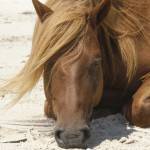Gastric Impaction in Horses: Usually a Good Prognosis

Gastric impaction refers to cases where horses eat a large quantity of feed, filling their stomachs to the point of discomfort, and the feed does not move into the intestine but stays in the stomach for a period of time. Horses that eat very rapidly, do not chew their feed well, do not have access to water, or eat feeds that tend to swell after ingestion are prime candidates for gastric impaction. The overfilled and nonmobile stomach causes discomfort that shows up as typical colic signs: disinterest in feed, kicking or looking at the abdomen, pawing, and sour attitude.
In a Finnish study of 20 horses with gastric impaction, diagnosis was made by gastroscopic examination. Treatment was administration of fluids into the stomach, and 18 cases resolved. Two horses were euthanized, one because it did not respond to treatment and one because rupture of the stomach was suspected.
Based on this report, gastric impaction has a good prognosis in most horses. To limit the chance of gastric impaction, owners should feed small quantities of grain in several meals throughout the day; take steps to slow horses that eat too quickly (place a few large, smooth stones in the feed trough to force a horse to pick around for its feed); ensure the horse always has access to fresh, clean water; and soak dehydrated feeds thoroughly before offering them to the horse. Check with a veterinarian any time abdominal pain is suspected in a horse.








